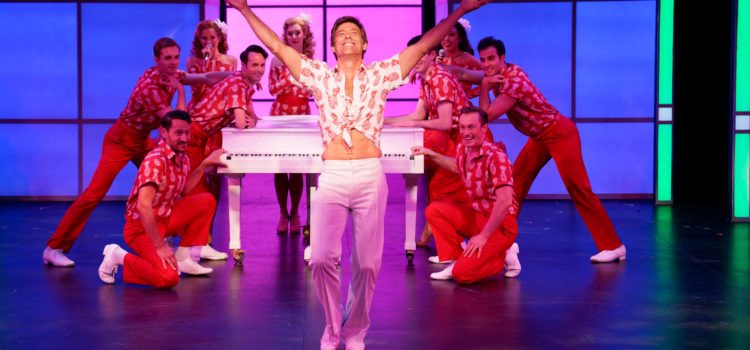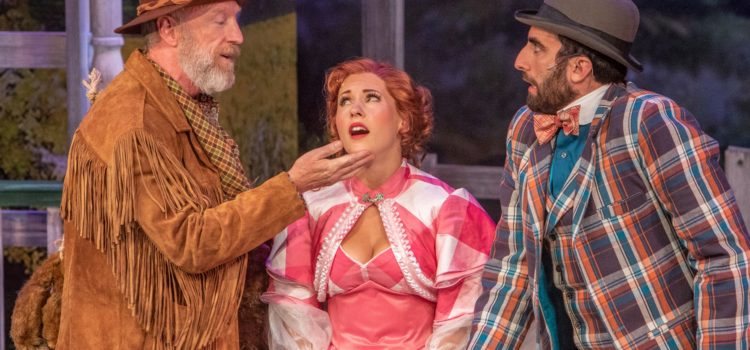By Lynn Venhaus
Managing Editor
Although Peter Allen did not get a Hollywood ending, his remarkable true-life
story of how he skyrocketed to fame through sheer talent, drive and his
ebullient personality deserves a splashy musical as good as Stages St. Louis production.
“The Boy from Oz” is the kind of glitzy material that the
company has excelled at for 33 seasons, their intimate stage a canvas for
crowd-pleasing flashy numbers and lavish costumes, with added poignancy that
tugs at our heartstrings. Allen died of AIDS-related throat cancer in 1992; he
was 48.
You may not recognize the name, but you have heard Allen’s
songs, and this show reminds us of his catchy pop hits and power ballads, which
he often wrote for other artists (Olivia Newton-John, Melissa Manchester, Rita
Coolidge).
The Stages production is the Midwest premiere of this rarely
produced musical, although Hugh Jackman won a Tony in 2004 for Leading Actor in
a Musical in the first Australian production ever mounted on Broadway.
Born in a small bush town, Aussie Allen became one of the greatest showmen of the 1970s and ‘80s, and in the title role, David Elder makes him unforgettable. With his charming smile and boundless energy, Elder glides into the role with ease – singing and dancing with oodles of pizzazz, from tender love songs to the era’s disco beats.
Elder’s bravura performance is a stunning display of sass, class and Energizer Bunny motion. Winning over the crowd from his first appearance as the adult Peter, he dynamically captures the life force that Allen was, daring to say: ‘I am who I am, and you can’t ignore or stop me.’ It’s one of the most muscular and joyous lead performances of the year.
As Allen’s fame grew, he was a regular on the talk show
circuit, brightening up those couches, often wearing his trademark Hawaiian
shirts. I recall how genuine he seemed as an entertainer, although extremely
flamboyant – he clearly loved the glamour of showbiz, opened at Carnegie Hall,
danced with the Rockettes at Radio City Music Hall and sang on the Academy
Awards.
This musical, with a snappy book by Martin Sherman and Nick
Enright, emphasizes his life as tailor-made rags-to-riches name-in-lights legend.
The cheeky wit is endearing as Elder narrates Allen’s first-person story.
To chronicle his life, original producers Ben Gannon and Robert
Fox used Allen’s own music and lyrics: “Best That You Can Do” (1981 Oscar
winning song known as “Arthur’s Theme” co-written with Burt Bacharach, Carole
Bayer Sager and Christopher Cross), “I’d Rather Leave While I’m in Love,”
“Everything Old is New Again,” “Love Don’t Need a Reason,” “I Honestly Love
You” and “Don’t Cry Out Loud” among them.
Corinne Melancon and David Elder. Photo by Peter Wochniak“Not the Boy Next Door” turns out to be a fun number between
mother and son. Reliable veteran Corinne Melancon, who seemingly can play any
kind of role, from the pious Mother Superior in “Sister Act” to strong-willed
single mother Donna Sheridan in “Mamma Mia!” during her frequent summers at
Stages, provides affection and pride as Peter’s mother Marion Woolnough, strong
in voice and characterization.
And it’s not just Elder who is sensational, but two debuts are noteworthy. While his Allen interpretation is a slow build – I mean, he doesn’t start at 11, Michele Ragusa is an astonishing Judy Garland, feisty right out of the gate, quickly becoming a patron favorite and stealing the show with her well-timed quips, mannerisms and powerful vocals. Garland’s husband, Mark Herron, discovered Allen in of all places, Hong Kong.
Ragusa soars in “All I Wanted Was the Dream” and “Don’t
Wish Too Hard,” and the moving “Quiet Please, There’s a Lady on Stage” with
Elder.
Garland’s daughter and his future wife, Liza Minnelli, is played with panache by Caitlyn Caughell. She assumed the role after Sarah Ellis (St. Louis Theater Circle nominee as Laurie in “Oklahoma!”) was injured and needed surgery.
She portrays the right mix of bravado and vulnerability as Liza embarks on her own celebrated career, shows her mettle in “Come Save Me” and “She Loves to Hear the Music” with the ensemble. The couple, who divorced after seven years of marriage, remained friends for life, and Elder and Caughell convey that bond.
Michele Ragusa as Judy GarlandZach Trimmer portrays Peter’s longtime love, Texas model
Greg Connell, who died of an AIDS-related illness in 1984. He’s not a warm and
fuzzy character, so their relationship appears to have some holes in the
retelling. The pair share two affecting duets, “If You Were Wondering” and “Love
Don’t Need a Reason.”
Two boys, Ben Iken and Simon Desilets, alternate playing an
eager young Peter, who just wants to entertain, singing and dancing for small
change. Versatile mainstage mainstay Erik Keiser excels as Peter’s first
singing partner, Chris Bell, in their “brother act,” first appearing on
Australian Bandstand as The Allen Brothers. They would have a successful
touring cabaret act and appear on TV.
As is customary at Stages, Steve Isom plays several roles,
from Peter’s abusive alcoholic dad Dick Woolnough to his brusque manager Dee
Anthony.
The ensemble is as energetic and enthusiastic as Elder is,
and their showstopping grand finale, the 1976 salsa-flavored disco hit, “I Go
to Rio,” is a rousing number in which dancers make quite an entrance in Brad
Musgrove’s elaborate sequined costumes. Musgrove, who never met a sequin he
didn’t like, outdoes the Follies here in spectacular shiny silver-and-white outfits.
The costumes received their own applause, as did Dana Lewis’ robust choreography.
James Wolk’s scenic design is straightforward, allowing the
music numbers to be the focus, and there is a lovely nighttime New York skyline
through an apartment picture window. Sean M. Savoie’s brightly colored lighting
design complements Wolk’s set beautifully.
Director Michael Hamilton emphasizes the vivacious side of Peter while not forgetting the sorrow. He crisply stages the Judy-Peter-Mark-Chris number “Only an Older Woman” with as much oomph as he does with the exuberant ensemble numbers “Sure Thing Baby” at the Copacabana and “When I Get My Name in Lights.” Stuart Elmore’s orchestrations work well, while music director Lisa Campbell Albert varies the tempo to suit each singer.
“Caught between the moon and New York City” will always
define Allen for me. It’s just one of those phrases that you’ll always remember
with a smile, especially if you have fallen in love with the city like he did. And
he’s impossible to forget after seeing his story, “The Boy from Oz.”
David Elder and Ben Iken as old and young Peter AllenStages St. Louis presents “The Boy from Oz” May
31-June 30 at the Robert G. Reim Theatre in the Kirkwood Community Center, 111
S. Geyer Road, St. Louis, 63122. For more information or to purchase tickets,
visit www.StagesStLouis.org or
call 314-821-2407.

Lynn (Zipfel) Venhaus has had a continuous byline in St. Louis metro region publications since 1978. She writes features and news for Belleville News-Democrat and contributes to St. Louis magazine and other publications.
She is a Rotten Tomatoes-approved film critic, currently reviews films for Webster-Kirkwood Times and KTRS Radio, covers entertainment for PopLifeSTL.com and co-hosts podcast PopLifeSTL.com…Presents.
She is a member of Critics Choice Association, where she serves on the women’s and marketing committees; Alliance of Women Film Journalists; and on the board of the St. Louis Film Critics Association. She is a founding and board member of the St. Louis Theater Circle.
She is retired from teaching journalism/media as an adjunct college instructor.


